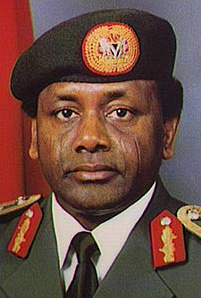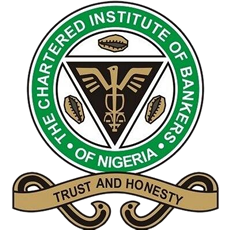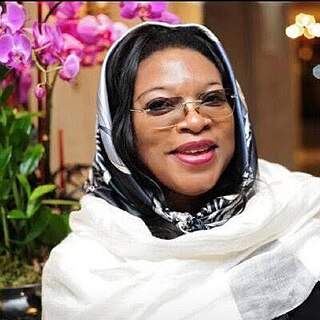Related Research Articles

The History of Nigeria can be traced to settlers trading across the middle East and Africa as early as 1100 BC. Numerous ancient African civilisations settled in the region that is known today as Nigeria, such as the Kingdom of Nri, the Benin Empire, and the Oyo Empire. Islam reached Nigeria through the Borno Empire between and Hausa States around during the 11th century, while Christianity came to Nigeria in the 15th century through Augustinian and Capuchin monks from Portugal. The Songhai Empire also occupied part of the region. The history of Nigeria has been crucially affected by the transatlantic slave trade, which started in Nigeria in the late 15th century. The first slave-trading post used by the British and Portuguese was Badagry, a coastal harbour. Local brokers provided them with slaves, escalating conflicts among the ethnic groups in the region and disrupting older trade patterns through the Trans-Saharan route.

Sani Abacha GCFR was a Nigerian military general who served as the military head of state of Nigeria from 1993 until his death in 1998. He was also Chief of Army Staff between 1985 to 1990; Chief of Defence Staff between 1990 to 1993; and Minister of Defence. In 1993, Abacha became the first Nigerian Army officer to attain the rank of a full military general without skipping a single rank.

Ibrahim Badamasi Babangida GCB GCFR popularly known as IBB; nicknamed, "Maradona" or "The Evil Genuis", is a Nigerian general who ruled the Federal Republic of Nigeria from 27 August 1985 until his resignation in August 1993. He served as president from 1985 to 1993, ruling for an uninterrupted period of eight years as military ruler and commander-in-chief. His years in power, colloquially known as the Babangida Era, are considered one of the most controversial, with Babangida and his regime been accused of being the most corrupt, and responsible for creating a political culture of corruption in Nigeria.

Chief Ernest Adegunle Oladeinde Shonekan is a Nigerian statesman, lawyer and businessman who was appointed the interim president of Nigeria by general Ibrahim Babangida on 26 August 1993.
Anioma are the Igboid,communities in Delta State. They are popularly known as Delta Igbos or Western Igbos. Anioma means Good Land in Igbo Language. Anioma consist of Enuani, Ukwuani, Ndokwa, Ika and Oshimili/Aniocha of Delta State. It has an estimated total population of approximately 1.8 million people.

Catherine Obianuju Acholonu was a Nigerian author, researcher and political activist.

The Second Nigerian Republic was a brief formation of the Nigerian state which succeeded the military governments formed after the overthrow of the first republic.
African feminism is a type of feminism innovated by African women that specifically addresses the conditions and needs of continental African women. African feminism includes many strains of its own, including Motherism, Femalism, Snail-sense Feminism, Womanism/women palavering, Nego-feminism, and African Womanism. Because Africa is not a monolith, these feminisms are not all reflective of the experiences African women have. Some of the feminisms are more specific to certain groups of African women. African feminism is sometimes aligned with, in dialogue, or in conflict with Black Feminism or African womanism as well as other feminisms and feminist movements, including nationally based ones, such as feminism in Sweden, feminism in India, feminism in Mexico, feminism in Japan, feminism in Germany, feminism in South Africa, and so on.
Maryam Babangida was the wife of General Ibrahim Badamasi Babangida, who was Nigeria's head of state from 1985 to 1993. Her husband was the target of criticism for rampant corruption during his regime. She was credited with creating the position of First Lady of Nigeria and making it her own.

The Chartered Institute of Bankers of Nigeria (CIBN) is the umbrella professional body for bankers in Nigeria. The CIBN was incorporated in 1976 as the Nigerian Institute of Bankers. It was chartered in 1990, and is now covered by the CIBN Act 5 of 2007. The Institute is authorized to control entry into the banking profession, to set standards for bankers and to maintain professional ethics through sanctions of erring members. Corporate members include the Central Bank of Nigeria, the Nigeria Deposit Insurance Corporation and all Deposit Money Banks, Development Banks, Mortgage Banks, Micro Finance Banks and Discount Houses in Nigeria.
Aisha Ismail MON is a Nigerian politician who was the Federal Minister of Women Affairs from June 1999 to May 2003, in the first cabinet of President Olusegun Obasanjo.
Colonel John Yahaya Madaki (?-2018) was military governor of Katsina State, Nigeria in December 1989, during the military regime of General Ibrahim Babangida. He handed over to the elected civilian governor Saidu Barda in January 1992 at the start of the Nigerian Third Republic.

The 1993 Nigerian presidential election was held on 12 June 1993 in the Nigerian Third Republic, the first since the 1983 military coup ended the country's Second Republic. The elections were the outcome of a transitional process to civilian rule spearheaded by the military ruler, Ibrahim Badamasi Babangida (IBB). The unofficial result of the election – though not declared by the National Electoral Commission (NEC) – indicated a victory for Moshood Kashimawo Olawale Abiola of the Social Democratic Party (SDP), who defeated Bashir Tofa of the National Republican Convention (NRC). The winner of the election was thus never declared as the elections were annulled by IBB, citing electoral irregularities. The annulment led to protests and political unrest, including the resignation of IBB and a weak interim civilian government, and culminated in the continuation of military rule in the country with Sani Abacha ascending to power as the military head of state via a bloodless coup later in the year.

Amina Temitope Ajayi is a US-based Nigerian business consultant who is an accountant by training, a social entrepreneur and an ardent community activist. Temitope Ajayi was the former President of All Nigerian American Congress (ANAC). Her efforts and continued advocacy on the Nigerian Diaspora issues have earned her in the media the moniker "Mama Diaspora". Chief Ajayi is well known for promoting women empowerment and poverty eradication in Africa through Agri-business. Through the Arkansas-Nigeria investment forum and other bilateral economic forums in the US, Chief Ajayi's tenacity and genuineness have been very instrumental in convincing and attracting a lot of key investors in the agri-business from the US to Nigeria. She is the Founder/CEO of the Nigerian American Agricultural Empowerment Program (NAAEP), which engages in the Agricultural empowerment of farmers, women and young Adults in Nigeria in order to increase foods sufficiency and sustainable employment for women and youths in the agricultural sector. NAAEP has been a grassroots organization that trains and empowers farmers in mechanized farming system, while facilitating business loans, accessibility to farm implements, and the harvesting and marketing of their end product both locally and internationally. In 2010, Chief Ajayi called on the Federal Government of Nigeria to reduce the interest rates on loans to farmers in order to boost the agricultural sector and to alleviate poverty in the country. Chief Temitope Ajayi is an Ambassador of Goodwill for the State of Arkansas and Maryland, USA. Chief Ms. Ajayi was a distinguished delegate at the past 2014 Nigeria's National Conference where she represented the National Council of Women Societies (NCWS) in Nigeria and served in the Confab's Committee on Agriculture. Chief Temitope Ajayi in her address at the Annual Meeting of the World Bank Group and International Monetary Fund, informed delegates that “Women are the engine of the private sector, women run the economy of any nation - because they are more into commerce than their male counterpart, the power of any currency is in their ability to meet the demand and supply”.
Bolanle Awe is a Nigerian history professor.

Hilda Adefarasin is a Nigerian women's right activist and former president of the National Council of Women's Societies (NCWS). She left her nursing profession in 1969 to concentrate on professional activities of the NCWS. In 1971, she was the council's treasurer and in 1987, she became the president.
Simisola Olayemi Onibuwe Johnson was a Nigerian dentist and gender advocate who served as Minister for Social Development and Culture during the nation's second republic. She was a former chairman of Allied Bank and the Lagos State branch of National Council of Women Societies. Johnson and Grace Guobadia both qualified as dentists in 1957, making both women the first set of trained female dentists in the country. She was a fellow of the National Postgraduate Medical College of Nigeria.
National Council of Women Societies, also known by its acronym NCWS, is a Nigerian non-governmental and non-partisan women's organization composed of a network of independent women organizations in Nigeria binding together to use NCWS' platform to advocate gender welfare issues to the government and society.
The Better Life Programme for Rural Women or BLP was a project in Nigeria started in September 1987 by Maryam Babangida, the wife of President Ibrahim Babangida. The programme was discontinued after a change in government. The idea of BLP originated at a workshop organized by Maryam Babangida with the scope of discussing the relegation of rural women in discourse affecting national development and the invisibility of positive actions towards causes favoring rural women. When the project started, the objectives were to reduce maternal and child mortality rate by increasing basic healthcare facilities for women, provide income-generating opportunities in agriculture and cottage industries, integrate rural women into national development plans and develop educational training for women.
Since the onset of the British imperial regime in the Northern Region of Nigeria, the Atyap people have reported a loss of land to the Hausas. In 1922, it was reported that a large piece of land was acquired by the Emir of Zaria, Dalhatu Uthman Yero, who failed to compensate the indigenous population of the region. In 1966, the land was provided to the Hausa trading settlement in the heart of Mabatado, called "Zangon Kataf", by the emir, Muhammad Usman. The Atyap resided within the district, in the Zaria Province of the Northern Region of, initially, British Nigeria, which became independent Nigeria. It was to remain utilized as a marketplace, where the indigenous Atyap people were banned from trading pork and beer by the settlers.
References
- ↑ Charles Mwalimu (2005). The Nigerian Legal System: Public law. Peter Lang. p. 713. ISBN 978-0-8204-7125-9.
- ↑ Jeremiah I. Dibua (2006). Modernization and the Crisis of Development in Africa: The Nigerian Experience. Ashgate Publishing, Ltd. p. 311. ISBN 978-0-7546-4228-2.
- 1 2 Amina Mama (1995). "Feminism or Femocracy? State Feminism and Democratisation in Nigeria" (PDF). Africa Development / Afrique et Développement. 20 (1): 37–58.
- ↑ National Commission for Women Act
- ↑ Apollo Rwomire (2001). African Women and Children: Crisis and Response. Greenwood Publishing Group. pp. 83–. ISBN 978-0-275-96218-0.
- ↑ Meet Nigeria’s First Ladies: One From The Other Room, The Vainglorious, The Schemer, The Co-President, And The Boisterous, Sahara Reporters, 22 June 2019. Accessed 21 January 2021.
- ↑ George Uzoma Ukagba (2010). The Kpim of Feminism: Issues and Women in a Changing World. Trafford Publishing. p. 422. ISBN 978-1-4269-2407-1.